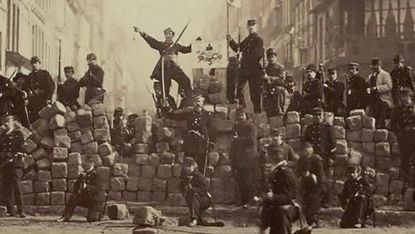Briefing: The Paris Commune
150 years ago, a socialist-inspired uprising briefly transformed the French capital, before it was ruthlessly crushed

Why was the Commune important?
For just 72 days – from 18 March to 28 May 1871 – a revolutionary government ran Paris, and espoused a great number of radical causes: decent conditions for workers; free universal education; separation of Church and state; the abolition of child labour; equality between men and women; citizenship for foreigners. Although it was soon put down with remarkable ferocity, the Paris Commune inspired socialist movements around the world. Karl Marx described it as the prototype for a future revolutionary government – “the form at last discovered for the emancipation of the working class”. Friedrich Engels saw it as the first true example of the “dictatorship of the proletariat”. Lenin’s tomb in Red Square is still decorated with red banners from the Commune brought to Russia by French communists.
What was the background to its emergence?
Subscribe to The Week
Escape your echo chamber. Get the facts behind the news, plus analysis from multiple perspectives.

Sign up for The Week's Free Newsletters
From our morning news briefing to a weekly Good News Newsletter, get the best of The Week delivered directly to your inbox.
From our morning news briefing to a weekly Good News Newsletter, get the best of The Week delivered directly to your inbox.
In 1870, France’s Second Empire, led by Napoleon III, Bonaparte’s nephew, went to war with Prussia and its German allies. The emperor’s generals had assured him that he would win easily and restore France’s dominant position in Europe, but the Prussians routed the French, capturing Napoleon III at Sedan on 2 September, along with 100,000 troops. The Second Empire collapsed, and the government retreated to Bordeaux. Paris, to some extent deserted by the well-off, was besieged by the Prussians for four months, causing great hardship – and defended by its National Guard, a militia made up mostly of workers, who became increasingly radicalised. In January, the new government agreed humiliating terms of surrender with the Prussian leader, Bismarck. France’s Third Republic was formed and a new government, dominated by provincial conservatives, was elected.
How did the Commune come into being?
Adolphe Thiers, the leader of the new government, recognised the revolutionary situation in Paris, and on 18 March sent soldiers to disarm the National Guard and remove hundreds of cannons. The Parisians were determined to keep them. In Montmartre, in the industrial northeast of the city, the crowd captured and executed the troops’ commander, General Lecomte, and another general, the hated former commander of the National Guard; the government and the army retreated to Versailles, and the Guard took control of the city. The Paris Commune was proclaimed at The Hôtel de Ville soon after, and the red flag of socialism raised over the building. On 26 March, municipal elections organised by the National Guard resulted in a clear victory for the revolutionaries, who formed a new Conseil de la Commune.
Who were its leaders?
The council, by design, had no single leader. Its delegates, known as the Communards, had a mixture of beliefs, from radical socialism to anarchism to moderate republicanism. Many influential delegates were Blanquistes, followers of Louis-Auguste Blanqui (then a government prisoner), who called for violent revolution and the redistribution of wealth. Others were anarchists or Proudhonistes, inspired by Pierre-Joseph Proudhon, who famously asserted that “property is theft” and wanted the state abolished and broken into autonomous communes run by workers’ councils – a society, as he put it, “without authority”. A smaller number were less radical Republicans, who sought the progressive reform of France’s institutions.
What did the Commune achieve?
It existed for little more than two months, and its proceedings were forever interrupted by emergencies, but in that time it managed to abolish the death penalty and military conscription. The peacetime economy was still suspended and much of the city subsisted on National Guard pay and rations, but the Communards introduced some economic reforms: they banned night baking, instituted a ten-hour workday and ruled that workers could take over a business if it was abandoned by its owner. The council did, for a time, run public services for a city of two million people. Perhaps more importantly, it was a time of unprecedented freedom and debate – “Everyone discusses, no one obeys,” complained one soldier – and of grand symbolic gestures. The Communards burnt the guillotine, and pulled down the Vendôme column to Napoleon I, calling it a “monument to barbarity and militarism”.
When did the government move against it?
On 21 May, around 130,000 well-armed government soldiers entered Paris. The unequal struggle with the 25,000 National Guard that followed is known as la semaine sanglante, the bloody week: regular troops, mostly from conservative rural France, who saw them as godless extremists, killed surrendered guardsmen on sight. The retreating Communards also killed a small number – including the Archbishop of Paris – and set fire to much of central Paris: the Louvre, the Palais-Royal, Notre-Dame. Their last stand came in the working-class northeast, in Père Lachaise cemetery, where 147 Guards, many of them wounded, surrendered. They were lined up against the wall of the cemetery (known today as the Communards’ Wall), shot, and thrown in an open trench.
What became of the remaining Communards?
The fighting fizzled out on 28 May, but a series of hasty trials and mass executions followed, in public parks and behind prison walls. About 40,000 people were arrested and more than 7,000 were deported, some to New Caledonia in the Pacific, many to other European nations where they spread the creed of internationalist socialism. (The Internationale was written by a Communard.) The army recorded 877 deaths. Estimates of the deaths on the other side range between 8,000 and 30,000. The Yale historian John Merriman, author of a history of the Commune, thinks that 15,000-17,000 were killed. But after the great ructions of the preceding century, this bloodbath was, in fact, followed by a period of stability for France: the Third Republic lasted until 1940.
Remembering Le temps des cerises
Among the half a dozen uprisings in Paris in the 1800s, the Commune stands out, even today. One reason for this is that, by the standards of revolutions, it was bloodless and innocently idealistic – yet it was crushed with a brutality exceptional for the period. This made martyrs of the Communards. Marx and Lenin revered their memory and learnt from what they saw as the Commune’s mistakes: they thought it should have dealt more harshly with its class enemies and properly abolished the old state, centralising powers in the hands of a revolutionary organisation.
The second reason, suggests the historian Robert Tombs on UnHerd, “is that it was short... It didn’t have time either to moderate into bourgeois banality, or to start devouring its own children.” As Marx noted, it was long enough only to indicate what might have been. Consequently, it’s easy to project fantasies onto this brief interlude of springtime liberation. “Always unfulfilled, its promise undiminished, it remains, in the words of a famous song written by one of its leaders, Le temps des cerises – the cherry time.”
Create an account with the same email registered to your subscription to unlock access.
Sign up for Today's Best Articles in your inbox
A free daily email with the biggest news stories of the day – and the best features from TheWeek.com
-
 'Make legal immigration a more plausible option'
'Make legal immigration a more plausible option'Instant Opinion Opinion, comment and editorials of the day
By Harold Maass, The Week US Published
-
 LA-to-Las Vegas high-speed rail line breaks ground
LA-to-Las Vegas high-speed rail line breaks groundSpeed Read The railway will be ready as soon as 2028
By Peter Weber, The Week US Published
-
 Israel's military intelligence chief resigns
Israel's military intelligence chief resignsSpeed Read Maj. Gen. Aharon Haliva is the first leader to quit for failing to prevent the Hamas attack in October
By Justin Klawans, The Week US Published
-
 Goodbye Lenin? How Russian revolutionary haunts Vladimir Putin 100 years on
Goodbye Lenin? How Russian revolutionary haunts Vladimir Putin 100 years onThe Explainer Current president has a complicated and contradictory relationship with his Soviet predecessor
By Elliott Goat, The Week UK Published
-
 The Battle of Stalingrad 80 years on
The Battle of Stalingrad 80 years onIn Depth Battle that turned the tide of Second World War remains a powerful symbol of patriotism in Russia
By The Week Staff Published
-
 Medieval warhorses ‘no bigger than modern ponies’
Medieval warhorses ‘no bigger than modern ponies’feature And other stories from the stranger side of life
By Chas Newkey-Burden Published
-
 Spain criminalises support for Franco in bid to heal divisions
Spain criminalises support for Franco in bid to heal divisionsIn Depth New legislation includes fines of up to €150,000 for ‘glorifying’ the dictator and Spanish Civil War
By The Week Staff Last updated
-
 Woman misses out on £18m jackpot after washing ticket
Woman misses out on £18m jackpot after washing ticketfeature And other stories from the stranger side of life
By The Week Staff Published
-
 Napoleon’s contested legacy
Napoleon’s contested legacySpeed Read Two hundred years after the death of Napoleon Bonaparte, a bitter debate is still raging in France over his place in its history
By The Week Staff Published
-
 Hitler’s toilet seat up for auction
Hitler’s toilet seat up for auctionfeature And other stories from the stranger side of life
By Chas Newkey-Burden Published
-
 Chernobyl forest fire: is the public at risk?
Chernobyl forest fire: is the public at risk?In Depth Atmospheric radiation spikes in exclusion zone following suspected arson blaze
By Gabriel Power Last updated